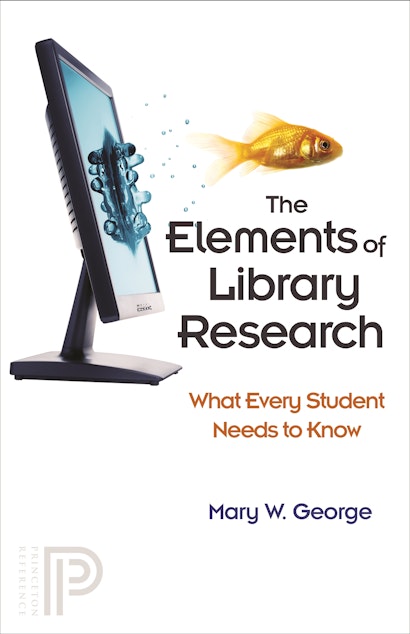To do solid academic research, college students need to look beyond the computer search engine. This short, practical book introduces students to the important components of the information-seeking process. The Elements of Library Research provides a foundation for success in any research assignment, from a freshman paper to a senior thesis.
Unlike guides that describe the research process but do not explain its logic, this book focuses entirely on basic concepts, strategies, tools, and tactics for research—in both electronic and print formats. Drawing on decades of experience with undergraduates, reference librarian Mary George arms students with the critical thinking skills and procedures they need to approach any academic project with confidence.
- Ways to turn a topic into a research question
- Techniques for effective online searches
- How to evaluate primary and secondary sources
- When and how to confer with reference librarians and faculty
- How to avoid plagiarism
- Glossary of key terms, from Boolean search to peer review
- Checklists, timelines, and hints for successful research projects
"George (reference, Princeton Univ. Lib.) has created a research guide for undergraduates. While the focus is on library research, George also briefly covers other methods of research students will encounter in college, such as experimental, field, and observational. The author makes excellent use of checklists and charts, along with 15 'Mary's Maxims' (e.g., 'Don't Settle for What's Handy') to highlight the steps students should take in the research process, as well as explaining important key research terms and how to evaluate sources. The book includes four appendixes, two of which, 'Research Timelines' and 'Questions To Ask Your Instructor,' would be extremely useful for students who are feeling overwhelmed by the research process. While aimed toward students, especially those inexperienced in the research process, the book would also be helpful for any librarians teaching introduction to research courses at their institutions. Recommended for high school and college libraries."—Julie Elliott, Library Journal
"Diving into research can be a daunting task, whether the quest for information is conducted by a first-year undergraduate or an experienced graduate student. Realizing that professors may assume a higher level of research proficiency in their students than exists in reality, George offers a fresh, comprehensive, enjoyable discussion for readers of all levels and abilities. . . . Engaging in successful research may be difficult for a novice, but readers of this work will possess a new confidence as they work through their undergraduate or graduate coursework."—C.D. Vidas, Choice
"Mary W. George has succeeded at describing the elements of library research in this monograph. She avoids overwhelming the reader with a list of specific titles to consult in each area of research, and instead encourages beginning researchers to dive into the process, take good notes, and produce a well-researched project. Overall, this book is a well-written and well-organized guide for how to turn curiosity into research and learning."—Margie Ruppel, Journal of Academic Librarianship
"Written with the student in mind, this volume covers the basic steps involved in library research and will prove to be an excellent resource for both teacher and student. The teacher, whose responsibility it is to provide consistent direction and research evaluation will particularly find this volume a useful tool. The introduction is clearly written and in an instructional style beneficial to both teacher and student. . . . Coupled with a glossary of library research terms, a selected bibliography, and a useful index, this volume will prove a valuable tool for educators for many years."—Joseph P. Hester, American Reference Books Annual
"Mary George offers a lively, succinct, and readable introduction to the work involved in planning a library research project. The book does an excellent job demonstrating that thought and creativity are required at every stage—from formulating questions and finding texts, to writing critically about them."—Joseph Harris, Writing Program, Duke University
"This book is based on the simple premise that college-level research need not be anxiety-inducing. Mary George does a good job explaining that the student can control the research process with practice and thoughtful reflection."—Emily J. Horning, Yale University Library
"This handbook is an important addition to the field of research guides. Librarians and those with research instruction responsibilities will certainly use it, and college students will benefit immensely from it. This resource will be useful to anyone who needs or wants to understand the intellectual underpinnings of the research process."—Denise M. Shorey, Main Library, Northwestern University
"This book is unique—in its brevity, its basis in our best understanding of the research process, and its focus on the thought processes associated with information gathering and synthesizing. This guide does a creditable job pulling together various veins of thought and presenting the content in a way that is consistent with current pedagogy on the research process."—Thomas G. Kirk, Lilly Library, Earlham College
"I have been trying to locate just such a book, so that students can begin their academic career with an easy to use, short guide to the research process. This will be an indispensable addition to both high school and college-level research."—Paula Clancy, Bunn Library, The Lawrenceville School
"This book has the advantage of being widely applicable and generally useful for many fields. Mary George points out that research is not just to learn old knowledge but to generate new knowledge, understandings, and perspectives."—Kendall Hobbs, Olin Library, Wesleyan University

